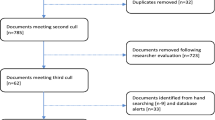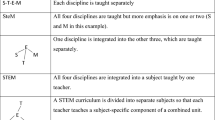Abstract
In this article, I endeavour to convey the depth of Barry Fraser’s contributions to science education research, including his tireless endeavours to promote and advance research, especially the field of learning environments, the realisation of his vision to create one of the largest doctoral programs in science and mathematics education in the world, his leadership capacity in terms of guiding and leading an internationally renowned centre and large-scale cross-national and cross-cultural studies, his dedication towards human capacity building in Africa, Asia and elsewhere, his capacity as a mentor and editor that have seen the publication of numerous journal articles and books and the ongoing success of science education research journals.
Similar content being viewed by others
References
Aldridge, J. M., & Fraser, B. J. (2008). Outcomes-focused learning environments: Determinants and effects (Advances in Learning Environments Research series). Rotterdam, The Netherlands: Sense Publishers.
Aldridge, J. M., & Fraser, B. J. (2011). Monitoring an outcomes-focused learning environment: A case study. Curriculum Perspectives, 31(1), 25–41.
Aldridge, J. M., Fraser, B. J., Bell, L. M., & Dorman, J. (in press). Using a new learning environment questionnaire for reflection in teacher action research. Journal of Science Teacher Education.
Aldridge, J. M., Fraser, B. J., & Huang, I. T. C. (1999). Investigating classroom environments in Taiwan and Australia with multiple research methods. The Journal of Educational Research, 93, 48–62.
Aldridge, J.M., Fraser, B.J., & Laugksch, R. (in press). Relationships between the school-level and classroom-level environment in secondary schools in South Africa. South African Journal of Education.
Aldridge, J. M., Fraser, B. J., & Ntuli, S. (2009). Utilising learning environment assessments to improve teaching practices among in-service teachers undertaking a distance-education programme. South African Journal of Education, 29, 147–170.
Aldridge, J. M., Laugksch, R. C., & Fraser, B. J. (2006a). School-level environment and outcomes-based education in South Africa. Learning Environments Research, 9, 123–147.
Aldridge, J. M., Laugksch, R. C., Fraser, B. J., & Seopa, M. A. (2006b). Development and validation of an instrument to monitor the implementation of outcomes-based learning environments in science classrooms in South Africa. International Journal of Science Education, 9, 123–147.
Fraser, B. J. (1975). Case studies in curriculum evaluation. Bentley, Western Australia: West Australian Social Science Education Consortium.
Fraser, B. J. (1980). Development and validation of a test of enquiry skills. Journal of Research in Science Teaching, 17, 7–16.
Fraser, B. J. (1981). Test of Science-Related Attitudes (TOSRA). Melbourne: Australian Council for Educational Research.
Fraser, B. J. (1990). Individualised classroom environment questionnaire. Melbourne, Australia: Australian Council for Educational Research.
Fraser, B. J. (Ed.). (1995). Improving science education. Chicago, IL: National Society for the Study of Education.
Fraser, B. J. (in press). Classroom learning environments: Retrospect, context and prospect. In B. J. Fraser, K. G. Tobin and C. J. McRobbie (Eds.), The second international handbook of science education. New York: Springer.
Fraser, B. J., & Fisher, D. L. (1982). Predicting students’ outcomes from their perceptions of classrooms psychosocial environment. American Educational Research Journal, 19, 498–518.
Fraser, B. J., Giddings, G. J., & McRobbie, C. J. (1995). Evolution and validation of a personal form of an instrument for assessing science laboratory classroom environments. Journal of Research in Science Teaching, 32, 399–422.
Fraser, B. J., & Tobin, K. G. (Eds.). (1998). The international handbook of science education. Dordrecht, The Netherlands: Kluwer Academic Publishers.
Fraser, B. J., Tobin, K. G., & McRobbie, C. J. (Eds.). (in press). The second international handbook of science education. Dordrecht, The Netherlands: Springer.
Fraser, B. J., & Walberg, H. J. (Eds.). (1991). Educational environments: Evaluation, antecedents and consequences. Oxford: Pergamon Press.
Fraser, B. J., Welch, W. W., & Walberg, H. J. (1986). Using secondary analysis of national assessment data to identify predictors of junior high school students’ outcomes. Alberta Journal of Educational Research, 32, 37–50.
Ginott, H. (1971). Teacher and child. New York: Collier.
Parker, L. H., Rennie, L. J., & Fraser, B. J. (Eds.). (1996). Gender, science and mathematics: Shortening the shadow. Dordrecht, The Netherlands: Kluwer Academic Publishers.
Taylor, P. C., Fraser, B. J., & Fisher, D. L. (1997). Monitoring constructivist classroom learning environments. International Journal of Educational Research, 27, 293–302.
Tobin, K., Kahle, J. B., & Fraser, B. J. (Eds.). (1990). Windows into science classrooms: Problems associated with higher-level cognitive learning. London: Falmer Press.
Treagust, D. F., Duit, R., & Fraser, B. J. (Eds.). (1996). Improving teaching and learning in science and mathematics. New York: Teachers College Press.
Acknowledgments
My thanks to Darrell Fisher, David Treagust and Lesley Parker for discussing their ideas about what they felt was important to include in this article and for providing feedback on my draft copy. Thanks also to Professor Fraser for reading through the article to check for accuracy and the inevitable editorial advice that he offered.
Author information
Authors and Affiliations
Corresponding author
Rights and permissions
About this article
Cite this article
Aldridge, J.M. Professor Barry Fraser’s contributions to science education research. Cult Stud of Sci Educ 6, 765–773 (2011). https://doi.org/10.1007/s11422-011-9341-7
Received:
Accepted:
Published:
Issue Date:
DOI: https://doi.org/10.1007/s11422-011-9341-7




